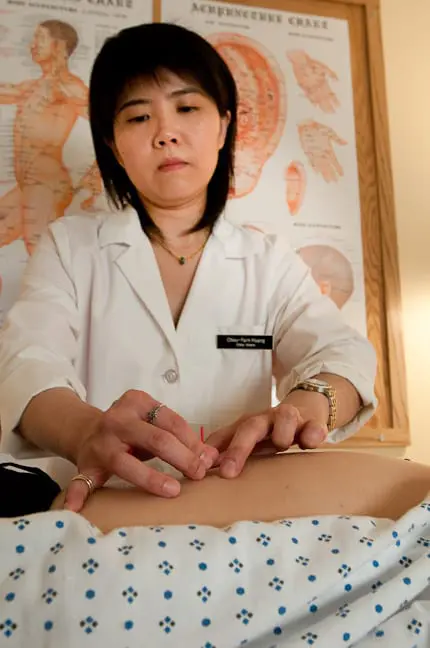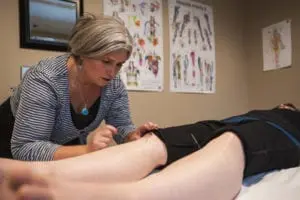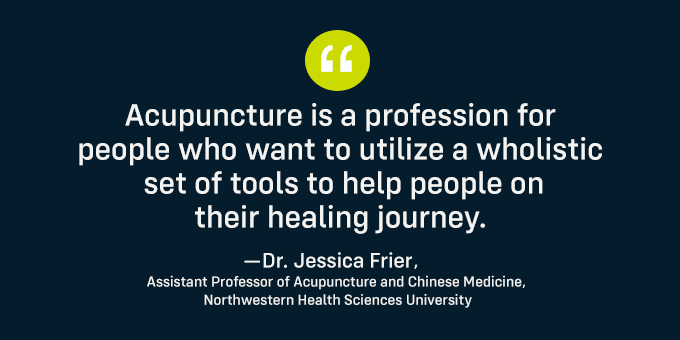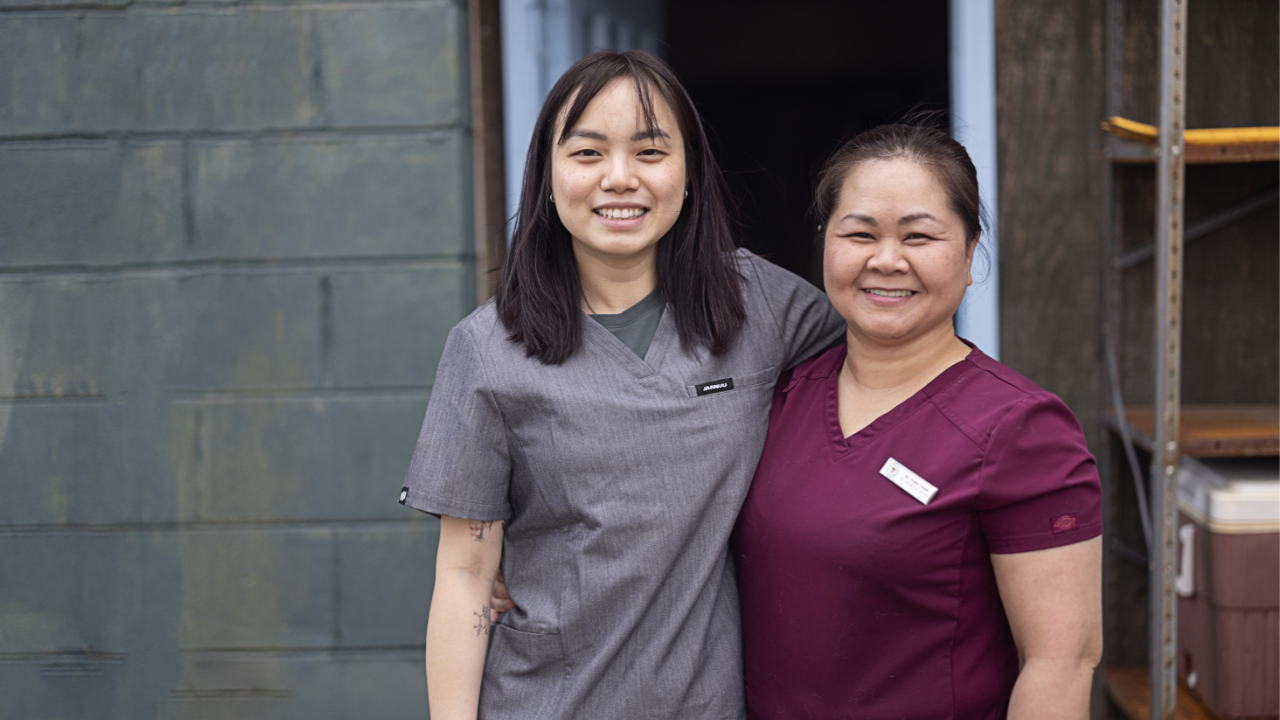Average Acupuncturist’s Salary: The Story Behind the Numbers
What is an acupuncturist’s salary? On your search to answer that question, you’ll likely find a range of incomes. Below, we’ll explore the factors that go into determining how much money an acupuncturist makes.
In addition, if you’re really trying to gain a fuller understanding of acupuncture as a career, you’ll also want to take into account other important information.
We’ll delve into the reasons for that below, but first let’s return to the question of salary.
How much is an acupuncturist’s salary?
Larry Morgan of the Orion HR Group, a human resources consulting firm specializing in compensation analysis, reports the following average acupuncturist salary information for the Minneapolis-St. Paul metro area as of May 2020.
Note that these salaries are for W-2 employees and do not reflect the income of acupuncturists who own/operate their own business:
- Graduate to one year of experience: $48,800 annually, with data varying from $48,200 to $49,000
- 10+ years of experience: $59,000 annually, with data varying from $56,000 to $62,000
Remember, this is information for the Minneapolis-St. Paul metro area. Many variables go into formulating reliable salary estimates. That’s why providing a single nationwide number is not the most accurate way to understand what an acupuncturist earns.
Below, we provide information that will help in your salary research and explain a number of factors that go into determining an acupuncturist’s salary.
What to look for in your salary research
There’s no shortage of online sources regarding an acupuncturist’s income. But to make the most of your research, consider the following important points.
Rely on the most trusted sources
According to Morgan from the Orion HR Group, the best salary information starts with industry surveys conducted by HR professionals. The results are then compiled and reviewed for accuracy. For any reported data that seems out of place, HR professionals conduct follow-up conversations.
“In addition to having the right expertise, HR professionals have access to resources that will produce the most accurate and unbiased salary information possible,” says Morgan.
Keep these data caveats in mind
When it comes to online sources for acupuncturist salaries, Morgan recommends paying attention to factors like the following:
The source of the data. Does the source have bias toward inflated numbers? How is the data collected, and is it “scrubbed” for outliers that can skew results and make them less accurate?
The method of data collection. How was the data gathered? By students, self-reporting, anonymous survey, HR professionals?
Size of the data set. How many participating organizations and how many people does the data represent? The more organizations participating and professionals represented, the more likely the data can be considered accurate.
Date of the salary data. The marketplace is not static. The date the salary survey information was collected is important. The general labor market is trending upward at 3.1% to 3.2% annually. That’s why data should be “aged” to present day numbers.
Know the shortcomings of salary sources
Morgan also says to be aware of the inherent shortcomings of salary sources like the following:
Professional associations and industry magazines. These rely on member- or subscriber-reported data. These data sets may be small, reflect higher end salaries, and could be biased toward favorable numbers.
Salary-specific websites. Popular sites like GlassDoor, Salary.com, and PayScale rely heavily or exclusively on self-reported salary information. The data sets reflecting salary amounts tend to be less accurate.
Government sites. State government sites and the U.S. Bureau of Labor Statistics, for example, may not show information specifically for acupuncturists or may reflect data that’s low to market and difficult to review.
However, they may be helpful in providing salary information, especially when considering location and the larger data sets from which their numbers are based.
Understand there can be a degree of control over your income
The more patients you see in a day or a week, the greater your earning potential. This point is specifically relevant to acupuncturists who either have their own clinic or are a partner or associate in a setting where they have the freedom to set their own schedules and patient loads.
Although many acupuncturists work solely on a fee-for-service system of payment, others opt to accept insurance, which can be another avenue for reimbursement and can augment the revenue from cash-only patients.
Yes, accepting insurance means taking on more time-consuming administrative responsibilities, but some acupuncturists find that it’s worth it, especially when considering that it can open up patient streams from large health insurance networks.
Keep in mind taxable income for owners vs. employees
Many acupuncturists have their own practice. In these cases, acupuncturists double as business owners. That means they have a host of overhead tax-deductible business expenses that can lower their reported taxable income.
To understand what an acupuncturist truly earns, this is an important point. The reported income for these acupuncturists may appear lower than what some would expect (or hope).
However, that income – thanks to legitimate tax deductions – may not necessarily reflect the true financial rewards they enjoy.
In turn, the income of acupuncturists as employees will not reflect the various kinds of deductions that private practice owner-operators have.
Note that more and more acupuncturists are joining hospital and clinic staffs. In these cases, they’re also receiving employee benefits like health insurance coverage, retirement benefits, and paid time off.
Remember that geography matters
Not surprisingly, where you practice as an acupuncturist will influence how much you make. Keep this in mind as you’re looking at overall “average” salaries.
In fact, to get a better sense of an acupuncturist’s salary, narrow your searches to regions or specific metropolitan areas and see if you can find job listings for acupuncturists that also include salary information.
Know that compensation will vary with the work setting
If you’re trying to understand what an acupuncturist can make, it’s important to know that your compensation will vary from one work setting to another. Acupuncturists today can work in a wide range of places (more on this point in the next section).
Here are some examples of the many places acupuncturists work today:
- Chiropractic offices
- Massage therapy practices
- Integrative care clinics
- Primary care clinics
- Hospitals
- Private practices
- Hospices
- Athletic facilities
As you get a better sense of the earning potential for acupuncturists, you should also consider a number of other important factors – and attractive features – that are part of the profession, like those described below.
Beyond the dollars: The many benefits of being an acupuncturist
To truly appreciate the acupuncture profession, there’s definitely more to understand than just the income numbers. Let’s return to Jessica Frier, DAOM, Program Chair and Assistant Professor of Acupuncture and Chinese Medicine at NWHSU.
An encouraging job outlook with a growing number of career options in healthcare
Have you ever thought about becoming a healthcare professional but aren’t sure what path is right for you? If so, Frier says there’s never been a better time to consider acupuncture.
“The career options for acupuncturists have changed dramatically in the last ten to fifteen years. Practitioners are being integrated into many different work settings that weren’t an option 20 years ago,” says Frier.
In fact, there’s plenty of evidence to support her optimism on acupuncture’s future:
- Given the painkiller/opioid crisis, an acupuncturist’s services are becoming an increasingly popular and effective alternative for pain management. For example, Abbott Northwestern in Minneapolis became the first hospital in the U.S. to offer acupuncture in the emergency room as an alternative to pain medication.
- Influential entities like The Joint Commission, the Food and Drug Administration, and the American College of Physicians all officially support acupuncture as a viable non-pharmacological option for pain relief. Developments like these serve to further strengthen the future of acupuncture.
- An increasing body of scientific research supports the effectiveness of acupuncture. Researchers at the University of York have found that acupuncture “reduces pain levels and improves mood levels.” In another example, a large study published in The Journal of Pain concluded that “acupuncture treatment is a reasonable option for chronic pain patients.”
- Memorial Sloan Kettering Cancer Center in New York City offers acupuncture treatment as part of a patient’s cancer treatment. And renowned institutions like the Mayo Clinic and Johns Hopkins Hospital also provide acupuncture services.
- The Veteran’s Health Administration now recognizes acupuncture as a stand-alone profession and hires full-time licensed acupuncturists for its facilities throughout the country.
- Acupuncture patients report high rates of satisfaction. For example, between 85% and 93% of acupuncture patients surveyed in a large-scale study stated that their acupuncturist successfully addressed their primary health issue.
Watch Angela Weber describe how she switched from a physician’s assistant path to studying acupuncture at NWHSU.
A rewarding career helping others that’s also low-impact on the body
The practice of acupuncture, says Frier, can be less physically taxing than other forms of healthcare practice.
“We have nurses from hospital settings and massage therapists from private practices, for example, who come to the acupuncture field as a second career because of that factor,” explains Frier.
She adds that acupuncture can be a career option people enjoy doing well into retirement age.
Enjoy the freedom that comes with having your own practice
Along with the growing opportunities for acupuncturists to work in a variety of healthcare settings, Frier says the option to operate your own clinic is still the most common way that acupuncturists practice. Although this path isn’t for everyone one, it does have unique advantages like the following.
Enjoy a more flexible schedule and an atmosphere you help create
Want to see patients on weeknights? Would you prefer to work Saturdays and have Mondays off? Do you want to work only half of the week?
When you have your own practice, you can have the kind of schedule that fits with your lifestyle and personal preferences.
What do you want your space to look and feel like, not just for you but also your patients? Another benefit of having your own practice is that you have the power to create your environment.
See former NWHSU student Stephanie Hylla discuss how she chose to become an acupuncturist and also why she enjoys running her own practice.
Control how much you work and earn
“People have different financial, personal, and professional goals. When it’s your own practice, you have the ability to shape the way you earn your income,” says Frier.
How much do you want to work? Frier points out that the typical way acupuncture treatment is administered does not require you to be in constant attendance of a patient the way that, for example, most massage therapists administer treatment.
And that’s an important point in relation to how many patients you see in a day, and how much you could earn.
“Usually the patient will be left alone for 25 to 35 minutes to relax with the acupuncture needles in place,” explains Frier.
Then in the meantime, many acupuncturists will have a second room where they begin treatment with another patient. “And if you don’t mind the pace, you could potentially see three patients in an hour.”
“Some definitely do not want to work that way. But the point is you have that option,” says Frier.
Lower costs to begin practicing
For acupuncturists who want to own their own practice, Frier says the profession’s start-up costs are significantly lower than many other types of private healthcare practices. This can create a much smoother path to opening your own establishment.
According to Frier, acupuncture needles, which are the main instruments needed to practice, are inexpensive. Along with a computer and medical records software, “Your most expensive initial purchases will probably include your treatment tables, which are several hundred dollars each,” she says.
“We are not an equipment-heavy field requiring a lot of medical devices,” Frier says. “If you start your own practice, your primary expense will likely be your monthly lease payment for your office space.”
Connect more deeply with patients on multiple levels
“Acupuncture is a profession for people who want to utilize a wholistic set of tools to help people on their healing journey,” says Frier.
Frier says people may not realize that an acupuncturist’s education and training prepares them for a broad scope of practice. For example, patients don’t just see an acupuncturist for pain-related issues.
“They might also come to see us for insomnia or anxiety, constipation, dietary recommendations, breathing exercises, and lifestyle changes.”
According to Frier, that’s why acupuncturists have the opportunity to connect with patients on multiple levels, “which can really help create a strong emotional and clinical rapport with them.”
Specialize in areas that interest you
Like many other healthcare professions, acupuncturists can also specialize in a particular kind of acupuncture service and/or work with specific kinds of patient populations such as these:
- Patients with fertility issues
- Expectant mothers
- Veterans
- Seniors
- Cancer patients
- Hospice patients
- Athletes
As an acupuncture student, you can begin to explore these options. For example, at NWHSU students have a variety of internship opportunities, both in our own clinics and other clinics in the community.
In addition, acupuncture falls under a broader category of Eastern/Chinese medicine. With the proper training and certifications, acupuncturists can also provide Chinese medicine and herbal consultation services.
Take the next step toward becoming an acupuncturist
Are you interested in a career as an acupuncturist? Then take the next step today!
LEARN MORE About Our Acupuncture and Chinese Medicine Programs












